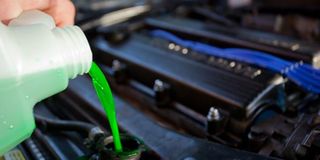ASK THE MECHANIC: When should I replace the coolant?

You should change the radiator coolant after every two years.
What you need to know:
I just want to know whether it is good to drain all coolant in the engine and replace it with new one and if so, when should this be done?
Hello Paul, thanks for your articles. I just want to know whether it is good to drain all coolant in the engine and replace it with new one and if so, when should this be done?
Ronny Paul Kaweesa
Hi Ronny, it is recommended that you renew your engine coolant every two years by draining all of it and refilling it with a suitable product. There are two types of coolant, the ready to fill pre mixed coolant (should not be mixed with water) or the concentrated one which you mix with water on a 50:50 ratio. During combustion of fuel in the engine block, car engines generate temperatures well over 100 degrees celsius.
In order to avoid damage of fast moving internal engine parts, it is important to cool the engine by maintaining the normal operating temperature between 80 -95 degrees celsius. Good coolant comprises of a good heat transfer medium such as a blend of high quality water and Ethylene glycol, corrosion inhibitors and functional additives. A good quality blend of coolant will serve as a heat depressant (heat transfer), lubricant to protect the water pump and corrosion inhibitor to protect the engine and radiator against corrosion damage.
The chemicals that make up coolant will deteriorate and lose their effectiveness over a period of two years due to heating and cooling of the engine. To maintain the useful role of coolant, it is recommended that you renew it every two years.
Hi Paul, I own a Toyota Premio model 1998 with a 7A petrol engine. I service it promptly from City Oil and its extension cables function properly.
1) I have however been observing overtime that its fuel consumption is higher than expected (at a rate of less than 10kms/ltr), yet previous similar models I have driven had a better consumption and were posting rates of up to 12kms/ltr
2) I have also observed that the engine makes an unusual rattling sound (ekyakala)and it does it vividly when I race it. I have been told to change the cylinder headtop.
How can I deal with these two problems?
Male Steven
Steven, poor engine tuning or damage of ignition system parts can lead to reduced fuel economy of your Toyota Corona Premio 7A engine. A vehicle engine with bad spark plugs, damaged high tension cables (spark plug wires), a dirty air filter, deposit filled or damaged intake valves will prevent efficient burning of the delivered fuel.
The resulting poor response and performance prompts the engine computer (ECM) to deliver more fuel as a means to improve power in so doing increasing the fuel consumption. Renewal of spark plugs and an air filter with genuine Toyota parts will fix this problem. Failure of engine management components like the oxygen sensor, which helps the ECM regulate fuel delivery by monitoring exhaust oxygen and temperature, will lead to fuel inefficiency. A computer diagnosis can quickly confirm this. When fuel is burnt in your DOHC 16 valve engine, the unburnt fuel residue forms deposits (after fuel burn deposit
formation) on your engine intake valves.
This affects the intake valve operation, causes wastage of fuel which is sucked by the spongy micro deposits and leads to reduced engine performance. Intake valve deposit formation can be controlled by fuelling your car with Shell Fuel Save Unleaded and Shell V-Power fuels which have detergent additive chemicals designed to prevent further deposit buildup.
The engine rattle when you race your Toyota engine is a symptom of an underpowered engine. This is normally caused by a weak spark - replace spark plugs; fuel supply restriction -replace overdue long life fuel filter and intake air irregular supply - clean the throttle valve with carburettor cleaner. On rare occasions the above situation can be caused by retarded or advanced engine timing after a timing belt replacement.
First rule out the above causes before dismantling or replacing the cylinder head. In more severe circumstances, the engine rattle will be continuous and more pronounced (loud). This is often a result of multiple engine valve failure due to a buildup of harmful oil sludge (thick lumps of oil).
Sludge restricts supply of lubricant around the engine and causes damage of fast moving metallic parts such as the valves in the cylinder head, piston rings or crankshaft bearings. Sludge buildup can be controlled by servicing your engine with Shell Helix Ultra fully synthetic motor oil that has detergent additives which prevent sludge build up.
0772316145
send sms: mycar (space) your comments and questions to 6933, or email them to [email protected]




